SOLANA

fadhit
2023-01-16 14:40
$SOL will pump in 2023, let's goo buy and hold $SOL

Positive

sayangpickaw
2023-01-16 13:25
solana $SOL will to the moon🚀🚀 in 2023

Positive
ZyeL
2023-01-15 23:11
my all time favorite crypto. to the moon 🚀

Positive
herdailywins
2023-01-15 03:43
very bullish on SOLANA!! TO THE MOON 🔥🚀🚀

Positive

chromaticka
2023-01-14 22:05
I love Sol. My favorite crypto!

Positive

NRFY
2023-01-14 14:33
future coins and will continue to the moon🚀🚀🚀

Positive
| Aspect | Information |
| Short Name | SOL |
| Full Name | SOLANA |
| Founded Year | 2020 |
| Founder | Anatoly Yakovenko |
| Support Exchanges | Binance, Coinbase, Kraken, Kucoin, etc. |
| Storage Wallet | Sollet, Phantom, Trust Wallet |
| Customer Support | Email: admin@freesolana.top |
Overview of SOLANA
Solana is a blockchain-based platform developed to provide fast, secure, and scalable decentralized applications and crypto-currencies. It was founded back in 2020 by Anatoly Yakovenko, a former engineer from Qualcomm. Solana's architecture is built with a unique method of ordering transactions called Proof of History (PoH), designed to overcome the scalability issues present in conventional blockchain platforms.
The Solana protocol's native cryptocurrency is SOL. Today, the Solana network is managed by the Solana Foundation, which is based in Geneva, Switzerland. The foundation operates with the mission to facilitate the spread and improvement of the blockchain on a global scale.
Pros and Cons
| Pros | Cons |
|---|---|
| High scalability | Less established compared to other blockchains |
| Fast transaction processing | Relatively new, potential for unforeseen technical issues |
| Low transaction costs | Limited adoption and acceptance, compared to Ethereum or Bitcoin |
| Unique Proof of History consensus |
Pros of Solana:
1. High Scalability: Solana's innovative architecture, which incorporates proof-of-history (PoH), allows it to process a high volume of transactions per second. This greatly increases scalability compared to traditional blockchain technologies that are limited in their throughput capabilities.
2. Fast Transaction Processing: The proof-of-history consensus mechanism also enables fast transaction validation. In particular, it allows for greater sequence of events, thus transactions can be processed in less time compared to other blockchains.
3. Low Transaction Costs: Solana's transaction costs are relatively low. This means it can accommodate micro-transactions which are commonly considered too costly to process on other platforms.
4. Unique Proof of History Consensus: Unlike most other blockchains, Solana uses a unique proof-of-history (PoH) consensus. This mechanism allows for a secure and quick verification process.
Cons of Solana:
1. Relative Newcomer: Despite its innovative approach, Solana is less established compared to other blockchains like Bitcoin or Ethereum. This could lead to slower adoption rates.
2. Potential for Unforeseen Technical Issues: Since Solana uses a unique and new consensus mechanism (PoH), it is possible that unforeseen technical issues may surface in the future. This represents an element of risk for users and developers.
3. Adoption Rate: While growing rapidly, Solana's adoption rate and acceptance are still limited compared to more established chains like Ethereum or Bitcoin. This could impact the liquidity and utility of its native token, SOL.
Security
Solanas security measures stem primarily from its unique consensus mechanism - Proof of History (PoH) and delegated Proof of Stake (dPoS). The PoH is a timestamp mechanism that allows the system to keep track and verify the order of events without external references. This effectively eliminates the need for miners and reduces the chance of malicious attempts to influence the data record.
On top of Proof of History, Solana also uses a delegated Proof of Stake consensus mechanism. This means that token holders can delegate the responsibility of validating transactions and securing the network to trusted nodes, thus adding an additional layer of security as it is extremely expensive and hard to control over half of the networks stake to manipulate the transaction record.
Furthermore, Solana implements cryptographic protections to maintain the privacy and security of transactions. All transactions on the Solana network are encrypted to protect against eavesdropping and tampering.
However, like any other platform, Solana is not immune to potential security risks. The system may face security vulnerabilities inherent to the PoH system and there could be unforeseen issues that emerge as the new technology develops and scales. Additionally, the relative centralization of the dPoS system can potentially be a weak spot, if a majority of token holders delegate their stakes to a select few validators.
How Does SOLANA Work?
Solana operates using a unique mechanism called Proof of History (PoH) coupled with Proof of Stake (PoS) consensus.
Proof of History is a timestamp system that verifies the order and passage of time between events. The PoH encoder creates a running hash of the current state along with a timestamp, and this information is automatically recorded on the blockchain. This running hash allows the system to easily verify the time and sequence of events without having to rely on third-party timestamps.
On top of PoH, Solana integrates the PoS consensus algorithm, wherein holders of Solana's native token (SOL) can delegate their stake to validators, who then confirm transactions and produce new blocks in the blockchain.
Solana's other key innovations include the Tower BFT (Byzantine Fault Tolerance), a modified version of Practical Byzantine Fault Tolerance to accommodate the specifics of the PoH mechanism. Solana also has Gulf Stream, which is a Mempool-less transaction caching and forwarding protocol, and Sea Level, a parallel smart contracts runtime.
These mechanisms work in harmony to ensure high throughput, secure and fast transactions, which results in lower fees and higher scalability on the Solana network. However, as can be with any technology, the effectiveness of these systems can only be truly evaluated as the platform continues to develop and face real-world tests.
What Makes SOLANA Unique?
Solana presents several unique features and technological innovations that set it apart from other blockchain platforms.
1. Proof of History (PoH): Solana's most notable feature is its introduction of Proof of History. In contrast to traditional consensus mechanisms, PoH adds a temporal element, creating a chronological record of all transaction events. This improvement drastically enhances the speed of transaction validation and overall network efficiency.
2. High Transaction Speed: Thanks to PoH and Solana's optimized network protocols, such as Gulf Stream and Sea Level, the platform can process upwards of 50,000 transactions per second, dramatically outpacing many other leading blockchains.
3. Low Fees: Despite its high transaction speed, Solana maintains very low transaction costs, making it an attractive choice for applications that require small, frequent transactions.
4. Parallel Processing: Solanas Sea Level feature allows for parallel smart contract runtime, which aids in expediting the execution and settlement process within the network.
5. Tower Byzantine Fault Tolerance: Solana has customized the classical Byzantine Fault Tolerance algorithm to work seamlessly with its PoH mechanism. This customized version, known as Tower BFT, further enhances the security and scalability of the platform.
6. Validator participation: Solana also encourages users to participate as validators, creating a more inclusive and decentralized network. However, validators do require a substantial stake in SOL tokens to contribute to the network, ensuring they have a vested interest in maintaining network integrity.
7. Earn money through tasks: Individuals can earn SOL through a variety of activities such as viewing ads, completing shortlinks, and taking on tasks or offers. These interactive methods serve as a user-engaging approach for users to effectively accumulate Solana rewards, making the SOL cryptocurrency distinctly beneficial for its holders.
It's important to note that these innovations do come with their own potential risks and challenges, such as possible technological vulnerabilities and centralization concerns due to the staking mechanism. Nonetheless, these unique features position Solana as a significant player in the blockchain space.
Price of SOLANA (SOL)
Solana (SOL), as of the current data as of Nov 15, 2023, is trading at a price of $62.47, observinga16.59% increase with 24-hour trading volume around 3.73 billion.
Solana's total supply is around 562,464,395 SOL, and the circulating supply is about 422,423,391 SOL. Interestingly, Solana does not have a maximum supply cap, suggesting an infinite amount of SOL tokens can hypothetically be issued. The fully diluted market cap amounts to about $35.14 billion.
The everchanging market dynamics affect the price fluctuation of Solana, making it crucial for investors to stay updated with the market trends.
Exchanges to Buy SOLANA (SOL)
There are several high-profile exchanges where you can buy Solana (SOL) among others. Some of them include:
Binance, one of the world's leading cryptocurrency exchanges, supports SOL trading paired with various currencies.
Coinbase, widely recognized for its user-friendly interface, also offers SOL and can be especially beneficial for beginners in crypto trading.
Kraken, known for its security measures and wide range of supported cryptocurrencies, allows users to buy and sell SOL.
KuCoin, a rapidly growing exchange, makes SOL available for trading.
Always remember to practice safe trading habits and do thorough research before making any transactions on these platforms.
How to Store SOLANA (SOL)?
There are several reliable wallets you can use to store Solana (SOL).
One option is the Sollet web wallet, a user-friendly platform that not only allows you to store your SOL but also interact with DApps on the Solana blockchain.
Another option is the Phantom browser extension wallet, which is easily accessible and offers a seamless experience for managing your Solana assets and NFTs directly from your browser.
For mobile users, the Trust Wallet mobile wallet is a high-security option that supports Solana. It provides a convenient way for you to manage and store your SOL from your mobile device.
These options prioritize security and user experience, offering various solutions based on individual needs and preferences.
How to Sign Up?
To sign up or create a wallet on Solana, you would typically follow these steps.
1. Choose a Wallet: You can select any wallet that supports Solana. Popular options include the Sollet web wallet, the Phantom browser extension wallet, or the Trust Wallet mobile wallet.
2. Installation: Download and install your chosen wallet, or open it in your web browser if it's a web wallet or browser extension.
3. New Wallet Creation: Most wallets would prompt you to create a new wallet when opened for the first time. Follow the instructions provided by the wallet to do so.
4. Save Your Seed Phrase: During wallet creation, you will be provided with a 12 or 24 word seed phrase. This phrase is the key to your funds and wallet backup. Make sure to write it down and keep it in a secure place.
5. Fund Your Wallet: Once created, you can use this wallet to receive, send, or store Solana tokens (SOL). You can acquire SOL tokens via cryptocurrency exchanges and transfer them to your wallet.
Remember, as with any blockchain wallet, you should maintain strict security practices to protect your funds. Avoid sharing your seed phrase or private keys with anyone, and be wary of phishing scams.
Can You Make Money?
Yes, clients can potentially make money by participating in the Solana ecosystem, although it's essential to note that all forms of investing, including in cryptocurrencies, involve risk. Here are a few ways in which one can potentially earn:
1. Staking: Owners of SOL tokens can stake their holdings to help secure the Solana network and, in return, earn staking rewards. Staking involves locking up the tokens and designating a validator to vote on the network on your behalf. However, while staking can be profitable, it's essential to be aware of the risks, notably the potential for slashing, in which a portion of your stake can be lost if the validator you've chosen acts maliciously.
2. Developing and Running Apps: As a developer, you can build and run applications on Solana. If your applications attract a user base, you can potentially generate revenue through service fees.
3. Trading SOL: Trading SOL on the crypto market, like with any other cryptocurrency, can potentially be profitable. Investors can buy SOL tokens low and sell high. However, the crypto trading market is highly volatile and trading should be done carefully.
4. View Ads, Shortlinks, do Offers, Task: View ads, complete shortlinks and participate in tasks or take up offers that reward in Solana, these are opportunities to accumulate this cryptocurrency while engaging in relatively simple activities.
Advice to bear in mind:
1. Research: Before investing or participating in any program on the Solana ecosystem, it's crucial to conduct an in-depth study. Understand the risks and potential benefits, and ensure that it aligns with your financial goals.
2. Diversification: Don't put all your funds into one type of investment. It is advisable to have a diversified portfolio to spread the risk.
3. Be cautious of scams: With the increasing popularity of cryptocurrencies, scams are also on the rise. Always verify the source and never share your private key or seed phrase.
4. Keep yourself updated: The field of blockchain and cryptocurrencies is rapidly evolving. Keeping yourself abreast of the latest news and developments will allow you to make more informed decisions.
5. Consult a financial advisor: Lastly, if you are unsure about your decisions, you may want to consult with a certified financial advisor with experience in cryptocurrencies.
Conclusion
Solana represents a substantial leap in the blockchain technology with its novel Proof of History consensus, which allows for rapid transaction processing and high scalability. Compared with many existing platforms, Solana offers an attractively low transaction cost, owing largely to its innovative architecture and efficient mechanisms.
However, like any new technology, it is faced with potential risks and challenges. These include the potential for unforeseen technical glitches in the unique PoH system, centralization concerns related to stake requirements for validators, and getting wider adoption in the competition with more established chains. Furthermore, its safety measures primarily stem from the PoH and delegated PoS systems, though potential vulnerabilities might still exist and should be addressed as the platform evolves.
FAQs
Q: What is the Solana blockchain platform?
A: Solana is a high-performance blockchain platform created by Anatoly Yakovenko in 2020, designed to support decentralized applications and cryptocurrencies.
Q: What are the primary benefits and drawbacks of Solana?
A: Solana is known for its exceptional scalability and fast transaction processing, but it's also a relatively new platform potentially facing unforeseen technical difficulties, and with a lesser adoption compared to more established blockchains.
Q: What's Solana's operational structure like?
A: Solana combines Proof of History with a Proof-of-Stake mechanism for network operations, processing transactions in a high-speed, secure way but like any system, its effectiveness can only be fully assessed as it continues to develop and respond to real-world challenges.
Q: What distinguishes Solana from other blockchain platforms?
A: Solana's unique Proof of History, its ability to process a high number of transactions quickly, low transaction fees, parallel processing, Tower Byzantine Fault Tolerance, and the opportunity for users to work as validators make it stand out in the blockchain space.
Risk Warning
Investing in blockchain projects carries inherent risks, stemming from the intricate and groundbreaking technology, regulatory ambiguities, and market unpredictability. Consequently, it is highly advisable to conduct comprehensive research, seek professional guidance, and engage in financial consultations before venturing into such investments. It's important to be aware that the value of cryptocurrency assets can experience significant fluctuations and may not be suitable for all investors.
Website

freesolana.top
Server Location
United States
Most visited countries/areas
--
Domain
freesolana.top
ICP registration
--
Website
--
Company
--
Domain Effective Date
--
Server IP
172.67.208.241



Content you want to comment
Please enter...
Comment 21
News
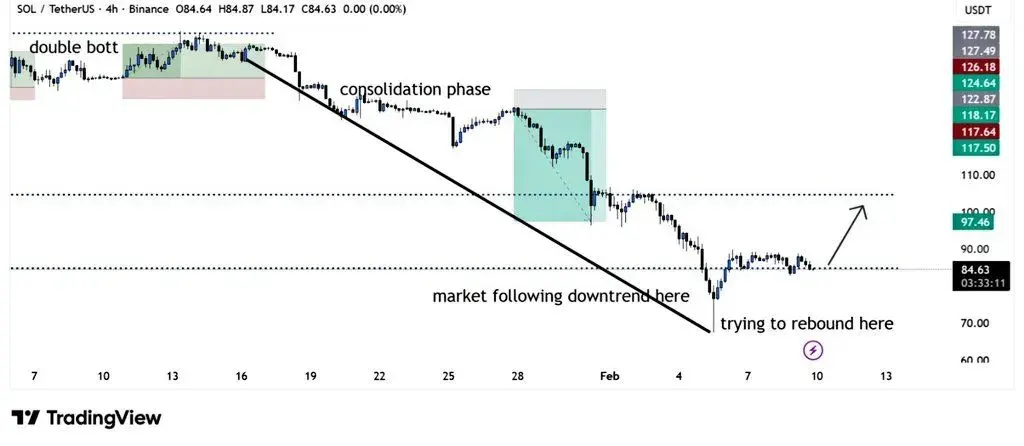
Solana Price Holds Key Support as Traders Eye $90 Breakout
Solanas price continues to draw attention as traders assess whether recent selling pressure has fina
2026-02-11 11:02
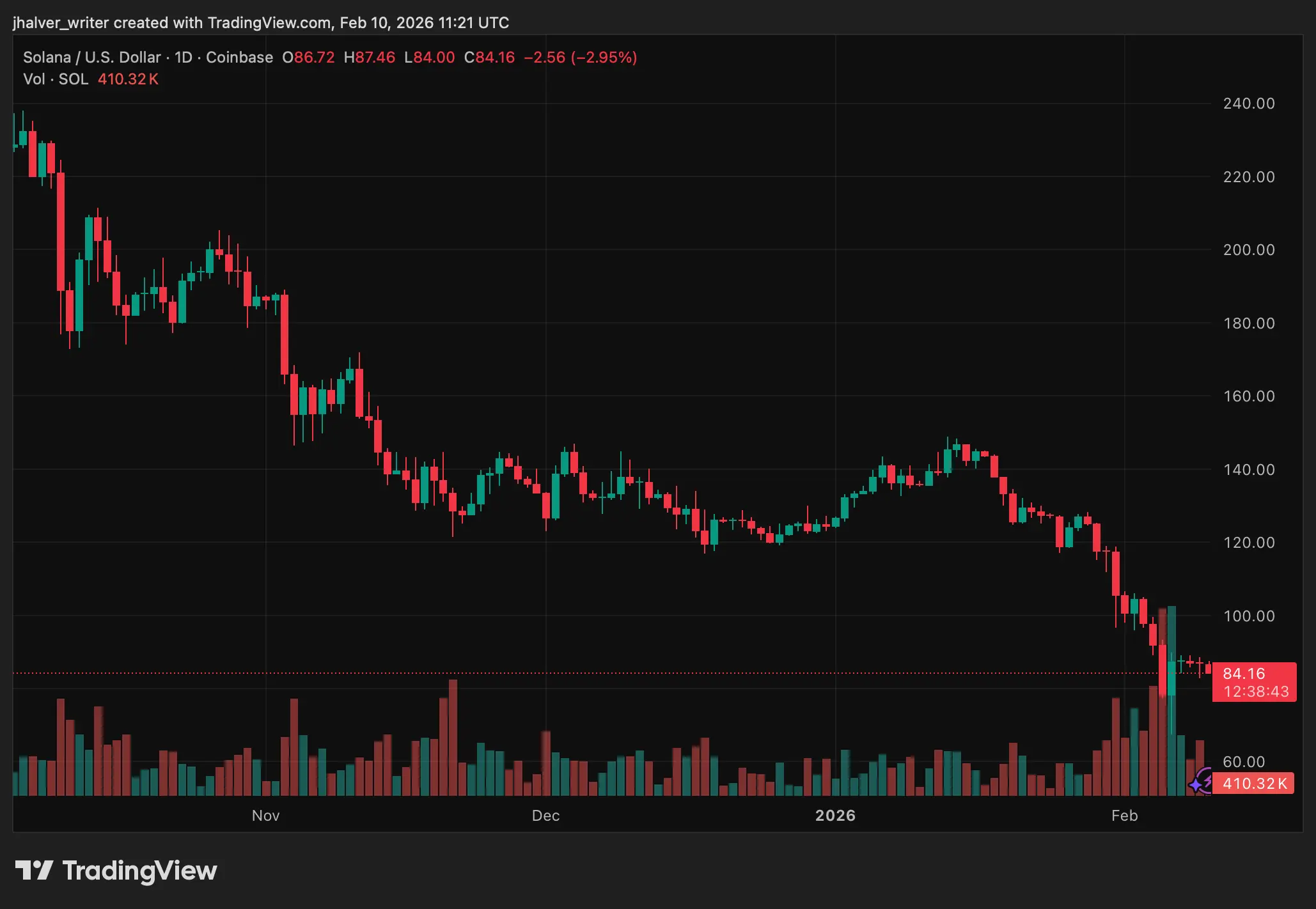
Solana Tests Key Support After Sharp Bounce, Analysts Weigh $98–$108 Upside for SOL
Solanas ($SOL) recent price action has put traders on alert once again. After sliding to multi-month
2026-02-11 07:02
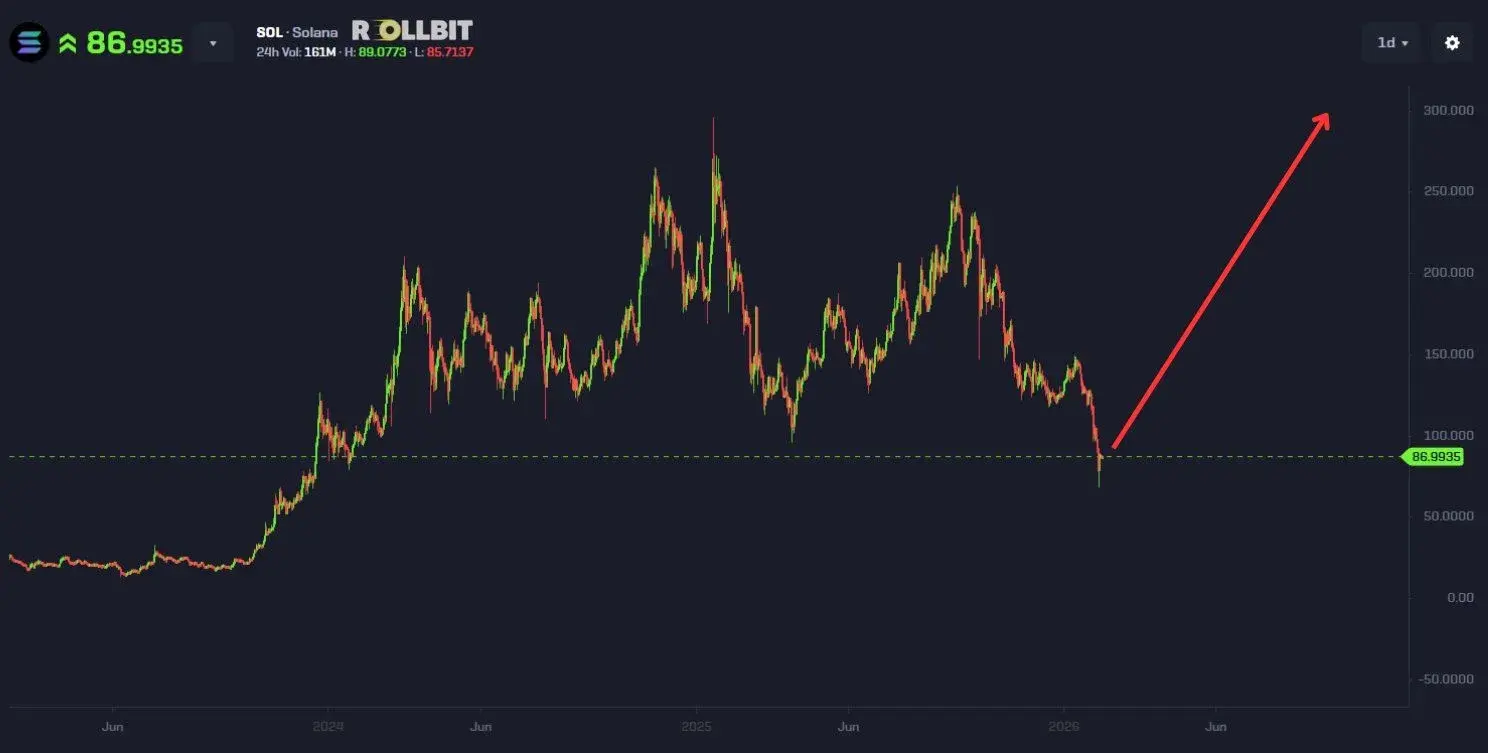
Solana Inflows Rise While Price Eyes $300 Target by May
Digital asset investment products showed early signs of stabilization last week as outflows slowed s
2026-02-10 06:02
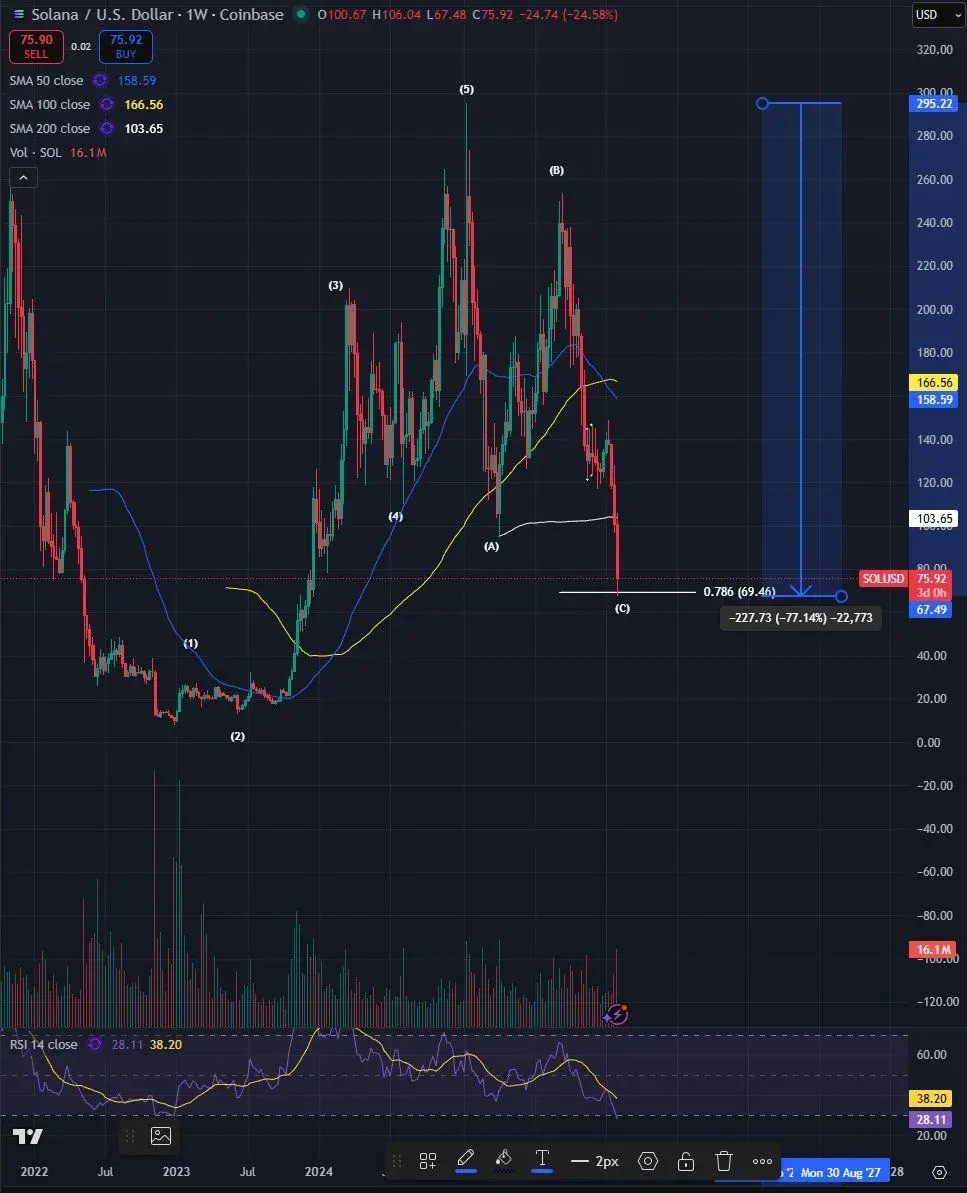
Solana Slips Under $80 as $69 Fib Zone and $75 Liquidations Take Over
Solana fell below $80 after a sharp weekly selloff pushed price into the 0.786 Fibonacci retracement
2026-02-07 19:00
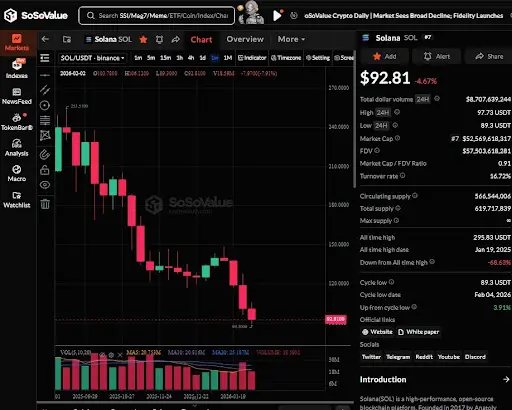
Solana Crashes Hard — And Big Money Isnt In A Hurry To Save It
Solana has suffered a sharp sell-off thats left its chart looking fragile, with price sliding straig
2026-02-07 08:02
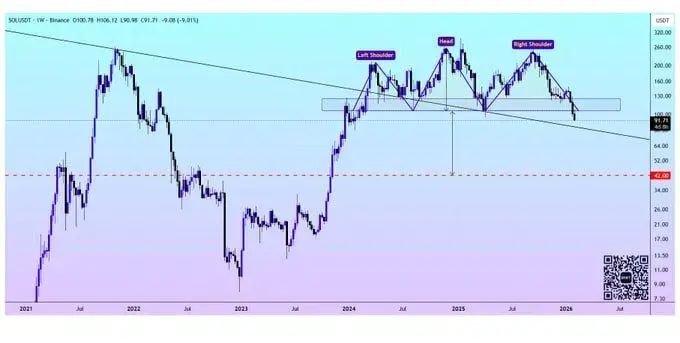
Solana Price Prediction: Head & Shoulders Sets $42 Target
Solana slipped below a key support zone, and two analysts now point to lower downside levels as the
2026-02-06 19:02
dvzeu
2022-10-28 23:46
WHEN $100 AGAIN :(
Neutral